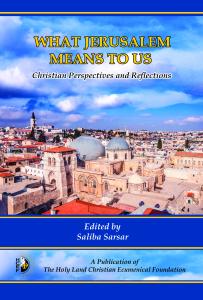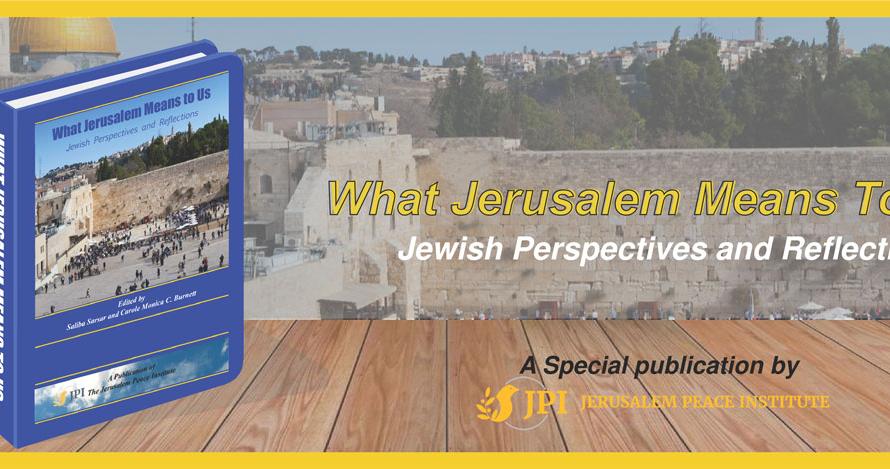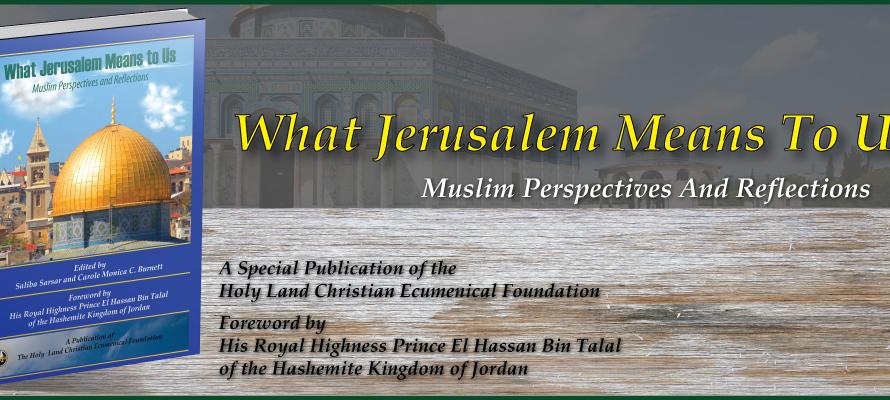PREFACE
What Jerusalem Means to Us
Christian Perspectives and Reflections
Sir Rateb Y. Rabie, KCHS
 Jerusalem is a city like no other. Nestled deep in the heart of three Abrahamic faith traditions, the city carries a special weight in our varying, but interrelated cosmologies. Although these cosmologies sometimes get entangled with our political aspirations, it is clear to me now, more than ever, that Jerusalem’s significance extends far beyond the pettiness of humanity’s selfish and exclusionary politics. Rather, Jerusalem’s divinity lies precisely in its multiplicity – in its ability to hold several meanings for various groups simultaneously. Jerusalem, when we have the clarity of mind to admit it, belongs to humanity in general – to all those who seek, strive for, and pursue a higher calling in its hallowed ground; and it should remain as such for generations to come.
Jerusalem is a city like no other. Nestled deep in the heart of three Abrahamic faith traditions, the city carries a special weight in our varying, but interrelated cosmologies. Although these cosmologies sometimes get entangled with our political aspirations, it is clear to me now, more than ever, that Jerusalem’s significance extends far beyond the pettiness of humanity’s selfish and exclusionary politics. Rather, Jerusalem’s divinity lies precisely in its multiplicity – in its ability to hold several meanings for various groups simultaneously. Jerusalem, when we have the clarity of mind to admit it, belongs to humanity in general – to all those who seek, strive for, and pursue a higher calling in its hallowed ground; and it should remain as such for generations to come.
For me, Jerusalem has a very personal significance – for it was there that I first heard a call that has since fundamentally redirected the course of my life. The year was 1998. I was leading a group of internationals and Palestinians living in the Diaspora and travelling from Birzeit, a small Christian town in the Palestinian countryside, to Jerusalem. This was part of an international convention to support Palestine. Many of my family members, who had remained steadfast in Birzeit wanted to send their children along with our group to pray at the Holy Sepulchre, the site of Jesus’ crucifixion and resurrection. Having been separated from Jerusalem since Israel illegally occupied and annexed its Eastern part, including the Old City, in June 1967 and formally made its annexation explicit in July 1980, many of my family members had not visited there in years, and some of the younger members had never even set foot in the holy city. Because we were a group of 500, difficult to check and process, we decided that we would try to get the children through to experience Jerusalem for the first time. I recall the fervor of that moment – galvanized by a sense of divine justice, we agreed that we would take the children with us, and that if they were denied entry, we would all turn back in an act of solidarity.
Tension was high when our bus arrived at the Israeli checkpoint. Young, Israeli soldiers, no older than 21, boarded our bus with semi-automatic weapons strapped to their backs, asking passengers for their documentation one by one. Since I had agreed to be the responsible party for the children, I sat in the back of the bus along with them, awaiting our turn for inspection. In what seemed an eternity, one of the soldiers made his way to the back of the bus, stopping at each row of seats before stepping in front of where I stood. He asked for my passport, looked it over carefully, and examined the name, the date, and the visa stamp. Once he had satisfied all his protocols, he looked beyond me, at the children seated behind, again at me, and then turned around and walked away. The entire bus held its breath as his heavy boots thudded against the floor, waiting for the tension to break. The moment the doors slammed shut, the entire bus erupted in clapping and cheering. We had gotten the children through! In the midst of my celebration, I noticed my daughter, quiet and confused in her seat. I asked her what was wrong, thinking the sight of the soldiers might have frightened her, and was surprised by what she asked me – a question that could only confound the innocent logic of a pre-teen. Why was it that she, who had come from thousands of miles away in Washington, DC with an American passport, could be allowed to enter Jerusalem, when her cousins who lived just a few miles away with a local ID were not allowed to visit a church to pray?
Later that afternoon, as I sat in one of the church’s chapels, reflecting on the day’s events, I was overwhelmed by the presence of God – by what I had understood to be a clear call to serve – a call to work on behalf of the persecuted church in Palestine. This call came to me with such power, with such resolve and force, that it was only weeks later that I decided to leave my business career to establish the Holy Land Christian Ecumenical Foundation (HCEF), a charitable organization dedicated to supporting Palestinian Christians living in the Holy Land.
Now, 20 years out, and much older but wiser, I feel this call as strongly as ever. Short of the decision to marry my wife, no other call has so fundamentally re-directed the course of my life. And no other vocation has so inspired in me such commitment or devotion.
For me, as is the case for many others, Jerusalem is a place of magic, hope, and possibility. What is at stake in today’s Jerusalem is not only a religious cause, but a human rights issue. As will be revealed in the pages that follow, Jerusalem holds a place of distinction and privilege in our collective spiritual imagination and in our personal understandings of home. All of us who claim Jerusalem as a spiritual home are joined in fellowship by its promise. Although I have the special honor of having been knighted as a Knight Commander of the Holy Sepulchre, we are all in our own way sworn to protect and serve Jerusalem’s promise by preserving it for Christians everywhere, and by sharing it with our Abrahamic brothers and sisters who genuinely seek peace and cooperation. I take solace in something that Saint Pope John Paul II said during his pilgrimage to the Holy Land in March 2000, “In this City, it should be eminently possible for Christians, Jews, and Muslims to live together in brotherhood and freedom, in dignity, justice, and peace.”[i] Not only is it eminently possible, but also is, I believe, divinely ordained.
The world’s attention is focused on Jerusalem. Christians of all backgrounds and denominations and others are urged to advocate for preserving Jerusalem’s Status Quo and for maintaining it as the inclusive center of faith. They are strongly encouraged to stand in solidarity with the “Living Stones,” the Palestinian Christians and other Christians who continue to witness in Jerusalem and elsewhere in the Holy Land, as they have done for the last two millennia. “Come to him, a living stone, though rejected by mortals yet chosen and precious in God’s sight, and like living stones, let yourselves be built into a spiritual house, to be a holy priesthood, to offer spiritual sacrifices acceptable to God through Jesus Christ” (1 Peter 2:4-5).
HCEF is proud to publish What Jerusalem Means to Us, which is timelier than ever. I would like to thank all those who contributed to the book and faithfully testified to the Christian stake in Jerusalem. Their courage, openness, and steadfastness in sharing their perspectives, reflections, or stories are deeply appreciated. Special thanks are also extended to Dr. Saliba Sarsar, our editor, who has poured his heart and intellect into the development of this overdue love letter to our Jerusalem.
Sir Rateb Rabie
Founder and President/CEO
The Holy Land Christian Ecumenical Foundation
Preface
The Holy See, Speech of Pope John Paul II at the ecumenical meeting in the Greek-Orthodox Patriarchate of Jerusalem, Jerusalem, Saturday (March 25, 2000): https://w2.vatican.va/content/john-paul-ii/en/speeches/2000/jan-mar/documents/hf_jp-ii_spe_20000325_jerusalem-patriarchate.pdf



